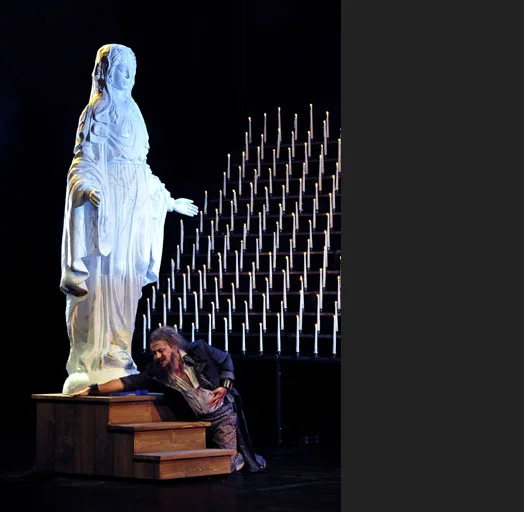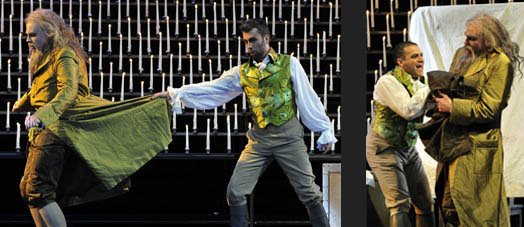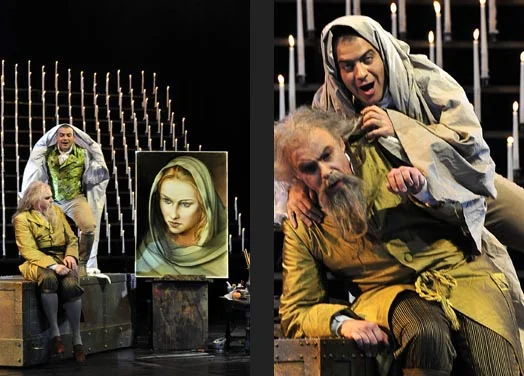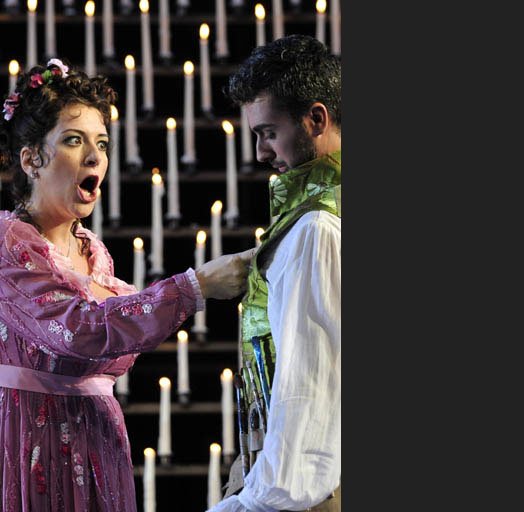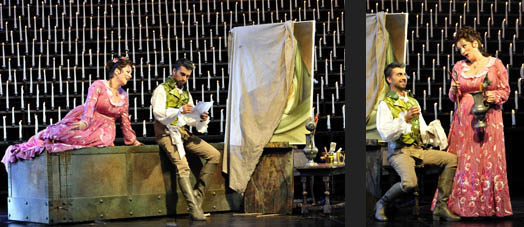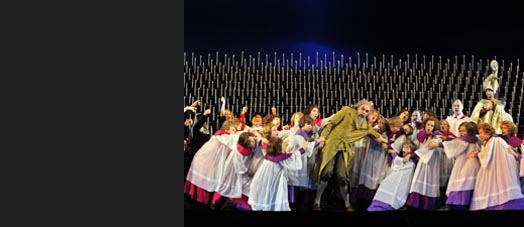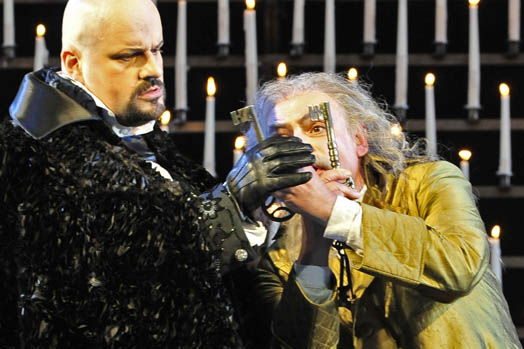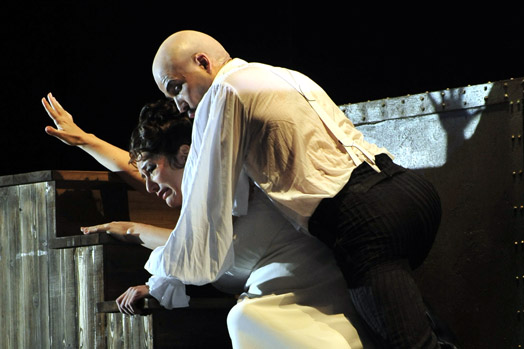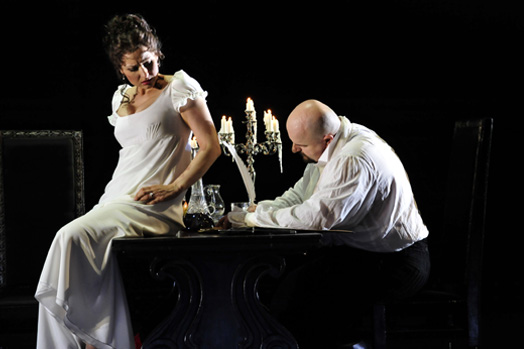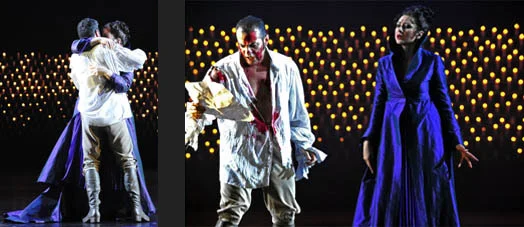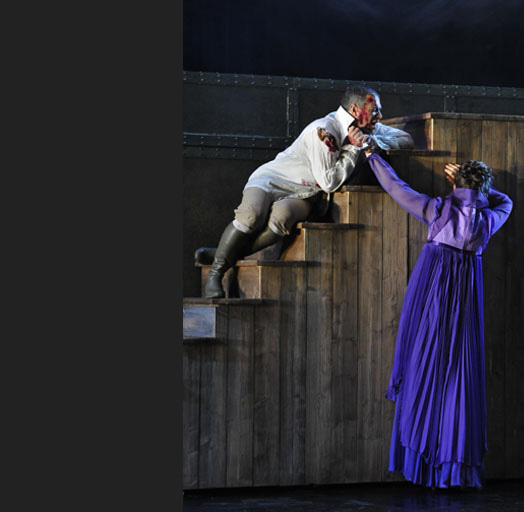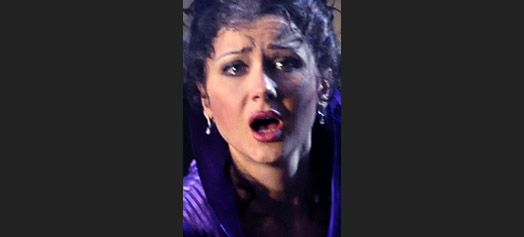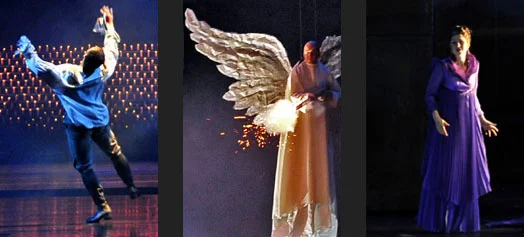TOSCA
OPERA IN THREE ACTS BY GIACOMO PUCCINI
FIRST ACT
SECOND ACT
THIRD ACT
PHOTOS © Andreas Birkigt / Oper Leipzig 2011
PRODUCTION
Oper Leipzig
intendant: Prof. Ulf Schirmer
première: 15 October 2011
conductor: Anthony Bramall
stage director / set design: Michiel Dijkema
costume design: Claudia Damm
light design: Michael Münster
dramaturgy: Christian Geltinger
Floria Tosca: Viktoria Yastrebova / Annalisa Raspagliosi
Mario Cavaradossi: Gaston Rivero / Bruno Ribeiro
Il Barone Scarpia: Sebastian Catana / Tuomas Pursio
Cesare Angelotti: Milcho Borovinov
Il Sagrestano: Jürgen Kurth
Spoletta: Timothy Fallon / Dan Karlström
Sciarrone: Matthew Anchel
Un carceriere: Klaus Bernewitz / Frank Wernstedt
Un pastore: Olena Tokar
chorus, children’s choir und extras of the Oper Leipzig
orchestra: Gewandhausorchester Leipzig
PRESS QUOTES
“startling innovations and visionary invention”
original and visually stunning production
The stage transformations at the close of the first and third act finales are breathtaking in their wonderful originality. […] Most of all – it was the original stage direction that most impressed me with its novel staging offering fresh ideas for this ever-popular opera, expressly in the stunningly dramatic transformations in the Te Deum and the final tragic climax of Puccini’s masterpiece. This is a Tosca production which is worth travelling far to see and enjoy for its startling innovations and visionary invention. A tremendous triumph for the Leipzig Opera company.”
Seen and Heard International
Gregor Tassie
18 January 2024
“exceptionally beautiful [...] grandiose”
Bloody beautiful Tosca in Leipzig
The première of Tosca was celebrated with standing ovations and bravo-shouting [...] The Dutchman Dijkema has a feeling for the essential. [...] This production is exceptionally beautiful, the set design grandiose [...] Summa summarum: This (bloody, sensual) opera is a romantic paramount achievement. Go on like this and more of it!
Wolf-Dieter Kröning
Bild
17. October 2011
“music theatre of overwhelming emotions”
The night side of the church
Michiel Dijkemas production of Tosca indulges the desire for music theatre of overwhelming emotions [...] for this opera on love, politics, tyranny and desire of freedom he finds visually stunning analogies. For example an enormous wall with 1000 prayer candles, which inescapably become shorter [...] or the monumental organ, which concludes the first act, on which the chorus is placed, capped and gowned as church dignitary [...] Finally the heavenly firing squad [...] Also the production team is basking in undivided jubilation.
Peter Korfmacher
Leipziger Volkszeitung
17 October 2011
“full of tension [...] thunderous applause”
For the laudation the organ is populated
[...] convincing protagonists. Between them develop scenes full of tension over and over again. [...] Thousand candles and a over-life-sized Madonna-statue mark the church, a pompous desk with twinkling crystal glassware the retreat of Scarpia, a box-shaped bunker the torture chamber.
[...] when in the last act the jailer comes out of the box, with a big bushy beard, a pipe and lots of theatre haze and meaningfully paces up and down, while shaking his head thoughtfully, it can’t be missed, that stage director and set designer Michiel Dijkema is playing with conventions. He is playing with the paradox of music theatre. The firing squad, which Tosca believes to bring her love freedom and not death, are rising angels with enormous wings. [...] When she runs away from the henchmen, the box in front of her opens and is lifted to the height of the stage opening. Tosca doesn’t jump, she falls down backwards on the stage floor. Curtain, thunderous applause. The executed Cavaradossi stands up, takes a bow, goes to the puppet of the fallen Tosca and she also stands up! Bow, applause. Long live opera, long live theatre.
Jens Daniel Schubert
Sächsische Zeitung
18 October 2011
“touching and enthralling theatre”
High acclamation for Tosca at the Opera Leipzig
In this production of Michiel Dijkema, who is also responsible for the set design, not only vocal excellence can be heard, but also touching and enthralling theatre is taking place. [...] an exciting opera evening, which was received with sustained applause.
[...] In the second act an iron wall comes down, thus creating an eerie room, from which one isn’t able to escape. The chief of police is distressing Tosca with a glowing burning iron. [...] The revolving stage continues to create new locations. They are mainly dominated by a sea of buring candles. And the tableau of clerical power in the church Sant’ Andrea della Valle, which is rising from the under-stage area, is pompous and breathtaking.
[...] Also the vocal quality and the acting in this new Tosca production are a sheer joy!
Dieter Beer
Thüringen Kulturspiegel
18 October 2011
“a fragile, utopian monument”
[...] A few stage elements like the long wall with church candles, a Madonna-statue or Scarpia’s writing desk unmistakably create a reduced but illusionistic Tosca-stage.
[...] The Te Deum, the final scene of the first act, creates a surprise, after Scarpia added fuel to Tosca’s jealousy towards her lover Cavaradossi and the intrigue takes its course: From the under-stage area rises an enormous church organ. The participants of the procession are placed between the organ pipes – a still life of cardinals and other clerical potentates.
[...] Only in the third act Dijkema breaks with the conventions which he introduced before: Tosca informs Cavaradossi that his execution will only be a fake execution and that they will leave Rome with a letter of safe-conduct. Together, on an ottoman, they airily play through their life in freedom, far from social constraints and repression, and for a moment the production unfolds a fragile, utopian monument. [...] At the end there is loud and prolonged applause.
[...]
Dijkema is no stranger to the Opera Leipzig: Two years ago he landed a remarkable success with his staging of Rossini’s Il Turco in Italia: Around his by now legendary libretto machine Dijkema created a turbulent play using different historical theatre forms with different layers and intentional friction between fiction and reality, which he combined to an entity as funny as intelligent.
Der Neue Merker
Ingo Rekatzsky
17 October 2011
“highly ingenious [...] spectacular”
This Tosca is technically highly ingenious, competently staged, also the costumes – top of the line costumes for connoisseurs [...] In any case, the enthusiasm speaks for itself: Not a single boo, frenetic plaudit, that we haven’t experienced since a long time at the Opera Leipzig. [...] Dijkema shows the second act as bloody as one might have never seen before. One can’t help but to be truly astonished. Also the torture of the painter Cavaradossi by Lemures-like downright Hoffmannesque figures is drastic. [...] Dijkema comes up with a spectacular jump of Tosca [...] with striking stage technique tricks
Dieter David Scholz
MDR Figaro Radio
17 October 2011
“impressive”
[...] Exactly this is the point of origin for stage director and set designer Michiel Dijkema. The atmosphere, which the sounds create, are enhanced by the set design. The element fire for example plays an important role. Hundreds of burning candles are placed on the stage and make during the first act the church perceptible by the senses. Also because of the costume designs and the make-up the overall impression can be described best as impressive.
Alina Brand
Mephisto
19 October 2011
“Leipzig has been waiting for this production”
Stage director Michiel Dijkema attaches a lot of importance to this liturgical aspect of Tosca. During the performance approximately 1000 candles illuminate the scenery, haze enhances the impression of a catholic church atmosphere. The Te Deum itself becomes the scenic culmination point of the evening, the whole chorus is raised up quasi as a living organ front. That’s impressive and also musically beneficial [...] the sets are congenially conceived.
[...] It is obvious that Leipzig has been waiting for this production. [...] the house was full and the atmosphere excellent!
Steffen Kühn
Leipzig Almanach
24 October 2011
“shattering and nightmarish”
Dijkemas Personenregie ist klassisch angelegt, und er erzeugt im Beziehungsgeflecht der drei Hauptprotagonisten eine große Spannung. Toscas flammende Leidenschaft und Eifersucht, Cavaradossis naives Freiheitsdenken sowie Scarpias Brutalität und seine Bigotterie kommen in dieser Inszenierung richtig gut zur Geltung. Raffiniert setzt der Regisseur auf die emotionale Wirkung von ausdrucksstarken Bildern. Stark der Beginn des Stückes mit etwa tausend brennenden Opferkerzen [...] Grandios das Te Deum am Schluss des ersten Aufzuges mit einer aus der Versenkung auffahrenden, mit dem gesamten Klerus gefüllte Riesenorgel. Hier wird dem musikalischen Verismo-Stil Puccinis ein großes und nachhaltiges Bild zugeführt. Wenn Cavaradossi im dritten Akt von einem Kommando großbeflügelter Engel erschossen wird, dann ist das erschütternd und beklemmend zugleich, auch hier wieder bildlicher Verismo. [...] Das Publikum am Schluss ist begeistert. [...] Diese Inszenierung ist wie großes Kino in HD und Dolby-Surround, ein spektakulärer Opernkrimi, nur eben live!
Andreas H. Hölscher
Opernnetz
9 November 2013
“This is how you make world theatre!”
The performance I attended was the 33rd since the première, and it seems that this production has great potential for being in the repertoire in Leipzig for a long time. Michiel Dijkema is both stage director and set designer, but he also works as an accompanist of singers. Maybe that’s why the show literally seemed to breathe. He staged many attractive scenes which perfectly fitted the spectacular set design. For example the Te Deum and the fascinating conclusion of the entire work with the fall of Tosca from the Castle of Angels. This is how you make world theatre!
EC (Prag)
opera a koncert, klasická hudba
21 October 2017
„spectacularly imaginative“
Am Vorabend der Premiere von Puccini’s „La fanciulla del West“ in der Oper Leipzig seine „Tosca“ aus dem Repertoire des Hauses (36. Vorstellung) zu erleben ist schon sehr reizvoll. Die Inszenierung ist sehr klassisch, aber in einigen Szenen ungewöhnlich, um nicht zu sagen: spektakulär und sehr theatralisch. Die aufsteigende Pyramide am Ende des 1. Aktes aus Menschen, drapiert um eine Orgel vor einem Meer von brennenden Kerzen ist, man darf es wohl sagen, so „kitschig“, dass es wieder als spektakulär einfallsreich empfunden werden kann. Ähnlich ist es in der Erschießungsszene im Finale der Oper, in der 7 großbeflügelte Engel gen Himmel schweben und mit ihren Sturmgewehren die Exekution Cavaradossis‘ vollziehen. Was für ein Einfall! […] Es ist zu hoffen, dass der Regisseur Michiel Dijkema für diese Einfälle mit einem Preis oder einem Orden ausgezeichnet wurde; wenn nicht, sollte man das nachholen!
Sven Godenrath
Opernparadies
4 October 2018

